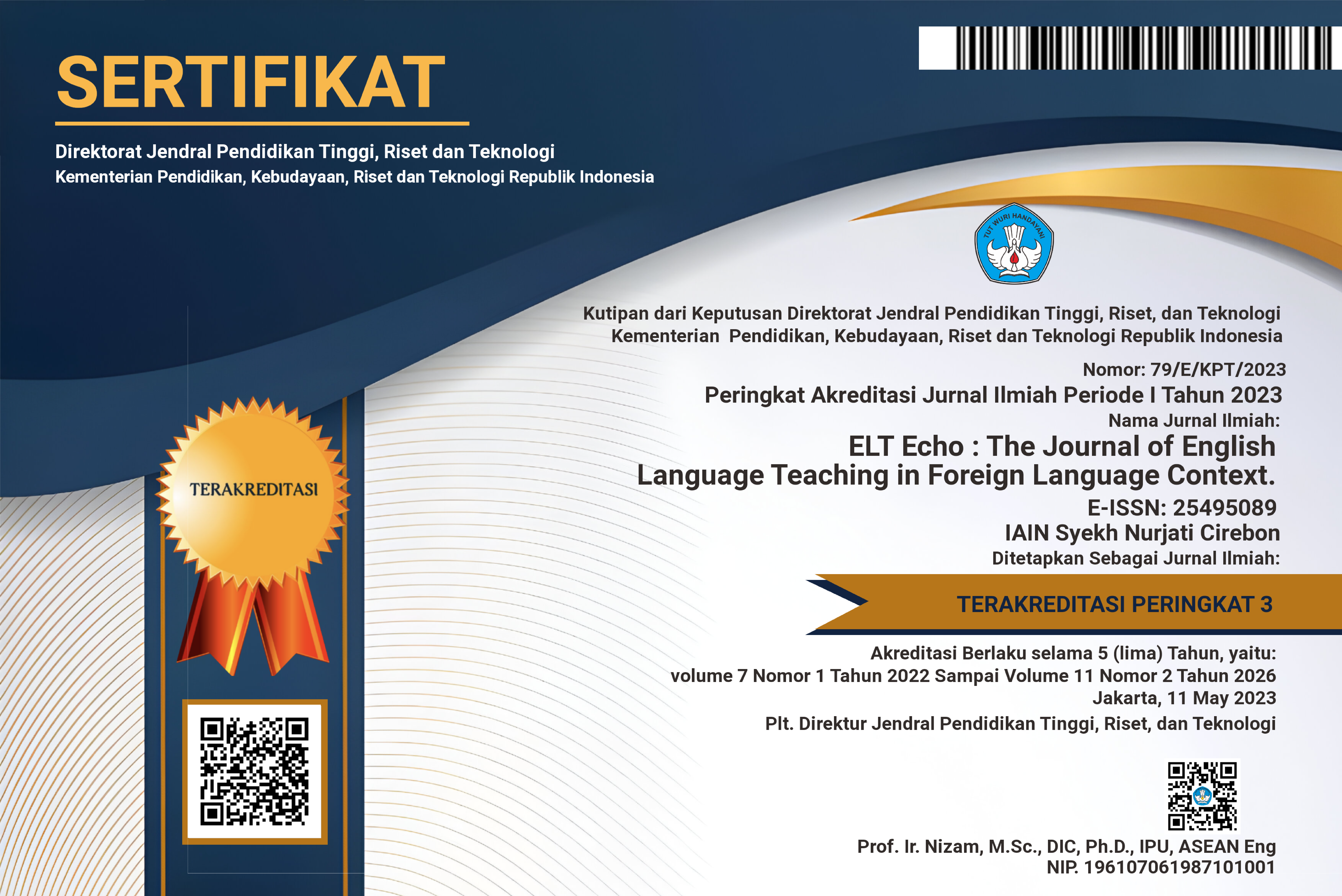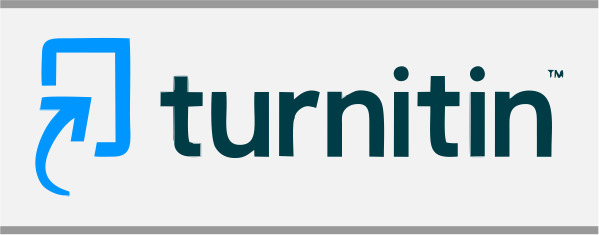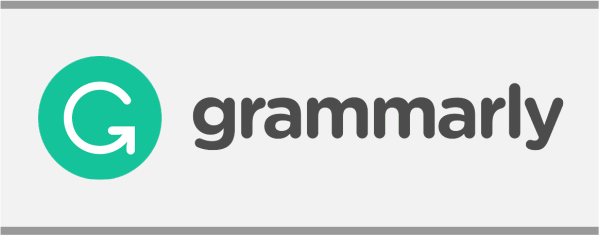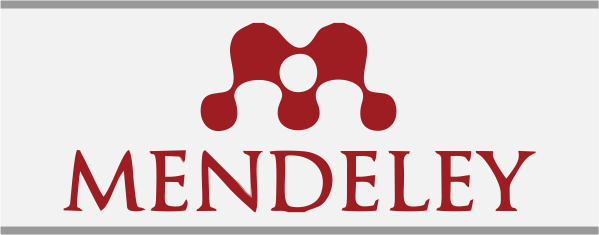University Students’ Critical Literacy in Their Speaking Skill
(1) University of Muhammadiyah Tangerang
(*) Corresponding Author
Abstract
Keywords
Full Text:
PDFReferences
Arjulayana, Rafli, Z., & Dewanti, R. (2021a). A Multiliteracy - Based Public Speaking Module.
Arjulayana, Rafli, Z., & Dewanti, R. (2021b). Representation Of Multiliteracies Approach in Student ’ s Academic Speaking Practice During Pandemic h. 7(9), 504–511. https://doi.org/10.5281/zenodo.5542033
Bancroft, J. (2016). Multiliteracy Centers Spanning the Digital Divide: Providing a Full Spectrum of Support. Computers and Composition, 41, 46–55. https://doi.org/10.1016/j.compcom.2016.04.002
Barnet, S., & Bedau, H. A. (2011). Critical thinking, reading, and writing : a brief guide to argument. 561. https://www.amazon.com/Critical-Thinking-Reading-Writing-Sylvan/dp/1457649977/
Becker, G. S. (2021). 8. A Theory of Social Interactions. In Accounting for Tastes (Vol. 82, Issue 6). https://doi.org/10.4159/9780674020658-009
Brown, H. D. (2004a). language assessment: principles and classroom practice. white plain,NY:Pearson Education.
Brown, H. D. (2004b). Testing, assessing, and teaching; Principles of language assessment. Language Assessment: Principles and Classroom Practices, 1–41.
Bruce Tillit & Mary Newton Bruder. (1999). Speaking Naturally (p. 128). https://makalahnyafikri.files.wordpress.com/2012/09/speaking_naturally.pdf
Burns, A. (1967). Teaching Speaking. Angewandte Chemie International Edition, 6(11), 951–952., 4(March), 763–773.
Chollet, M., Wörtwein, T., Morency, L. P., & Scherer, S. (2016). A multimodal corpus for the assessment of public speaking ability and anxiety. Proceedings of the 10th International Conference on Language Resources and Evaluation, LREC 2016, 488–495.
Cooke, S., Smith, L. E., Nelson, C. L., Yoshikawa, H., British Council, Harding, L., & Mcnamara, T. (2017). Language assessment The challenge of ELF. The Routledge Handbook of English As a Lingua Franca, 17(4), 570–582.
Cope, B., & Kalantzis, M. (1996). New Literacies , New Learning. Multiliteracies, 1–30.
de Paola, M., Lombardo, R., Pupo, V., & Scoppa, V. (2021). Do Women Shy Away from Public Speaking? A Field Experiment. Labour Economics, 70, 102001. https://doi.org/10.1016/J.LABECO.2021.102001
DeWaelsche, S. A. (2015). Critical thinking, questioning and student engagement in Korean university English courses. Linguistics and Education, 32, 131–147. https://doi.org/10.1016/j.linged.2015.10.003
Elsner, D. (2011). Developing Multiliteracies, Plurilingual Awareness & Critical Thinking in the Primary Language Classroom with Multilingual Virtual Talkingbooks. Encuentro, 20(20), 27–38. http://search.proquest.com/docview/968114257?accountid=14719 LA - English
Ersoy, M., & Güneyli, A. (2016). Social networking as a tool for lifelong learning with orthopedically impaired learners. Educational Technology and Society, 19(1), 41–52.
Fairclough, N. (2021). Critical Discourse Analysis: the critical study of language. In Angewandte Chemie International Edition, 6(11), 951–952.
Fajardo, M. (2016). Teaching Critical Literacy Using Multimodal Texts to College Students in the Philippines. University of Wollongong. https://ro.uow.edu.au/cgi/viewcontent.cgi?article=5876&context=theses
Fajardo, M. F. (2016). Teaching Critical Literacy Using Multimodal Texts to College Students in the Philippines. University of Wollongong.
Farahani, F. (2018). The Effect of Neuro-Linguistic Programming (NLP) on Reading Comprehension in English for Specific Purposes Courses. International Journal of Education and Literacy Studies, 6(1), 79. https://doi.org/10.7575/aiac.ijels.v.6n.1p.79
Farrelly, M. (2015). Routledge Critical Studies in Discourse (Issue July). Routledge: Taylor & Francis.
Felipe Fajardo, M., & Felipe, M. (n.d.). Teaching Critical Literacy Using Multimodal Texts to College Students in the Philippines Recommended Citation.
Goodrich, J. M., Lonigan, C. J., & Alfonso, S. V. (2019). Measurement of early literacy skills among monolingual English-speaking and Spanish-speaking language-minority children: A differential item functioning analysis. Early Childhood Research Quarterly, 47, 99–110. https://doi.org/10.1016/j.ecresq.2018.10.007
Goodsett, M. (2020). Best practices for teaching and assessing critical thinking in information literacy online learning objects. Journal of Academic Librarianship, 46(5), 102163. https://doi.org/10.1016/j.acalib.2020.102163
Gu, Z. (2018). Study of Multiliteracy Pedagogy in College English Teaching. 283(Cesses), 102–107. https://doi.org/10.2991/cesses-18.2018.23
Horarik, M. M., Devereux, L., Jack, C. T., & Wilson, K. (2018). Negotiating the territory of tertiary literacies: A case study of teacher education. Linguistics and Education Journal, 53(1), 1689–1699. https://doi.org/10.1017/CBO9781107415324.004
Huh, S. (2016). Instructional Model of Critical Literacy in an EFL Context: Balancing Conventional and Critical Literacy. Critical Inquiry in Language Studies, 13(3), 210–235. https://doi.org/10.1080/15427587.2016.1154445
Hussain Jafri, I., Yousuf Zai, S., Ali Arain, A., & Ahmed Soomro, K. (2013). English Background as the Predictors for Students’ Speaking Skills in Pakistan. Journal of Education and Practice, 4(20), 30–36. www.iiste.org
Isaacs, T. (2016). Assessing speaking. In Handbook of Second Language Assessment. https://doi.org/10.1017/s0267190500003548
Janks, H. (2013). Critical literacy in teaching and research1. Education Inquiry, 4(2), 225–242. https://doi.org/10.3402/edui.v4i2.22071
Kaur, S., & Sidhu, G. K. (2014). Evaluating the Critical Literacy Practices of Tertiary Students. Procedia - Social and Behavioral Sciences, 123, 44–52. https://doi.org/10.1016/j.sbspro.2014.01.1396
Khamkhien, A. (2010). Teaching English Speaking and English Speaking Tests in the Thai Context: A Reflection from Thai Perspective. English Language Teaching, 3(1), 184. https://doi.org/10.5539/elt.v3n1p184
Kim, Y. (2008). The effects of integrated language-based instruction in elementary ESL learning. Modern Language Journal, 92(3), 431–451. https://doi.org/10.1111/j.1540-4781.2008.00756.x
Kustini, S., Suherdi, D., & Musthafa, B. (2020). Moving towards 21st Century English Language Teaching Developing ESP multiliteracies-based materials.
Lazar, M. M. (2017). Feminist critical discourse analysis. The Routledge Handbook of Critical Discourse Studies, 372–387. https://doi.org/10.4324/9781315739342
Luke, A. (2012). Critical Literacy: Foundational Notes. Theory into Practice, 51(1), 4–11. https://doi.org/10.1080/00405841.2012.636324
Luoma, S. (2004). Assesing speaking (L. Alderson, JC. Bachman, Ed.; first). Cambridge University Press.
Machin, D., & Mayr, A. (2012). How to Do Critical-Discourse-Analysis. SAGE Publications Ltd.
Marzal, M.-Ã., & Borges, J. (2019). A Tool for Assesing Multiliteracy in Higher Education. In // Brazilian Journal of Information Science: Research Trends (Vol. 13).
Miller, A. (2015a). On paper, in person, and online: A multi- literacies framework for university teaching. Journal of Academic Language and Learning, 9(2), 19–31.
Miller, A. (2015b). On paper, in person, and online: A multi-literacies framework for university teaching. Journal of Academic Language and Learning, 9(2), A19-A31–A31.
Miller, A., & Schulz, S. (2014). University Literacy : A Multi-literacies Model Article begins on following page . Please note : English in Australia, 49(January 2014).
Mohammadkhani, A., Mazinani, E., Zandvakili, E., & Fard-Kashani, A. (2015). Facebook as a Platform for EFL Learning : Critical Literacy in Social Networking Websites. Journal of Applied Linguistics and Language Research, 2(6), 57–72.
Nagrani, A., Chung, J. S., Xie, W., & Zisserman, A. (2020). Voxceleb: Large-scale speaker verification in the wild. Computer Speech and Language, 60. https://doi.org/10.1016/j.csl.2019.101027
Patrona, M. (2006). Constructing the expert as a public speaker: Face considerations on floor-claiming in Greek television discussion programs. Journal of Pragmatics, 38(12), 2124–2143. https://doi.org/10.1016/j.pragma.2006.04.006
Pelajaran, M., & Kewarganegaraan, P. (2017). the Effectiveness of Critical Multiliteracies Mode in Improving Elementary Students ’ Civic. Skripsi Mahasiswa PGSD UPI, 1–13.
Prasetya, W. (2017). FOSTERING CRITICAL THINKING AND RESPECT THROUGH ( A Case Study of Bridging Program in the International Program of the Faculty of Economics , Universitas Islam Indonesia ). 1937(October).
Provenzo, E. F., & Apple, M. W. (2015a). Critical Literacy. Critical Literacy. https://doi.org/10.4324/9781315635385
Provenzo, E. F., & Apple, M. W. (2015b). Critical Literacy. Critical Literacy, 1–10. https://doi.org/10.4324/9781315635385
Richards, J. C., Viswamohan, A., Sanala, H. M., Nunan, D., Ramadan, S., Sabbah, M., Methods, T., Richa, R., Gudu, B., Introduction, I., Tips, A., Richards, J. C., Arung, F., Sembilanbelas, U., Kolaka, N., View, D. S., Arung, F., & Richards, J. C. (2008). Teaching Listening and Speaking: From Theory to Practice. In Language Teaching (Vol. 35, Issue April). https://doi.org/10.1017/S0261444802211829
Rogers, R. (2014). Coaching Literacy Teachers as They Design Critical Literacy Practices. Reading and Writing Quarterly, 30(3), 241–261. https://doi.org/10.1080/10573569.2014.909260
Rowland, L., Canning, N., Faulhaber, D., Lingle, W., & Redgrave, A. (2014). A multiliteracies approach to materials analysis. Language, Culture and Curriculum, 27(2), 136–150. https://doi.org/10.1080/07908318.2014.927883
Setiawan, D., Hartati, T., Rahman, R., & Cahyani, I. (2019). The Effects of Critical Multiliteracy Learning Models on Mastery of Explanatory Text Concepts. International Journal of Science and Applied Science: Conference Series, 3(1), 33. https://doi.org/10.20961/ijsascs.v3i1.32550
Shawer, S. F. (2016). Four Language Skills Performance, Academic Achievement, and Learning Strategy Use in Preservice Teacher Training Programs. TESOL Journal, 7(2), 262–303. https://doi.org/10.1002/tesj.202
Skerrett, A. (2010). Teaching Critical Literacy for Social Justice. Action in Teacher Education, 31(4), 54–65. https://doi.org/10.1080/01626620.2010.10463535
Street, B. (2006). Reading and Multiliteracy. Encyclopedia of Language & Linguistics, 369–373. https://doi.org/10.1016/b0-08-044854-2/00671-4
Tan, J. P.-L., & McWilliam, E. (2009). From Literacy to Multiliteracies: Diverse Learners and Pedagogical Practice. Pedagogies: An International Journal, 4(3), 213–225. https://doi.org/10.1080/15544800903076119
Tejedor-GarcÃa, C., Escudero-Mancebo, D., Cardeñoso-Payo, V., & González-Ferreras, C. (2020). Using Challenges to Enhance a Learning Game for Pronunciation Training of English as a Second Language. IEEE Access, 8. https://doi.org/10.1109/ACCESS.2020.2988406
Ugwudike, P. (2015). An introduction to critical criminology. In An Introduction to Critical Criminology. https://doi.org/10.2307/j.ctt1t89436
Wallace, C. (2003). Critical reading in language education. In Critical Reading in Language Education. https://doi.org/10.1057/9780230514447
Xi, X. (2007). Evaluating analytic scoring for the TOEFL® Academic Speaking Test (TAST) for operational use. Language Testing, 24(2), 251–286. https://doi.org/10.1177/0265532207076365
Yakut, Ä°. (2020). Promoting the correct production of English sounds in extensive reading-circle classes: Explicit vs. implicit pronunciation training. Eurasian Journal of Applied Linguistics, 6(1). https://doi.org/10.32601/ejal.710224
Zhang, W., Zhang, D., & Zhang, L. J. (2021). Metacognitive instruction for sustainable learning: Learners’ perceptions of task difficulty and use of metacognitive strategies in completing integrated speaking tasks. Sustainability (Switzerland), 13(11). https://doi.org/10.3390/su13116275
Zulfikar, Z. (2022). Reducing Efl Learners’ Speaking Anxiety Through Selective Error Correction and Group-Work Strategies. ELT Echo : The Journal of English Language Teaching in Foreign Language Context, 7(1), 69. https://doi.org/10.24235/eltecho.v7i1.10204
DOI: 10.24235/eltecho.v8i1.11855
Article Metrics
Abstract view : 74 timesPDF - 13 times
Refbacks
- There are currently no refbacks.
Â
This Journal is indexed by:
Â

This work is licensed under a Creative Commons Attribution 4.0 International License.










